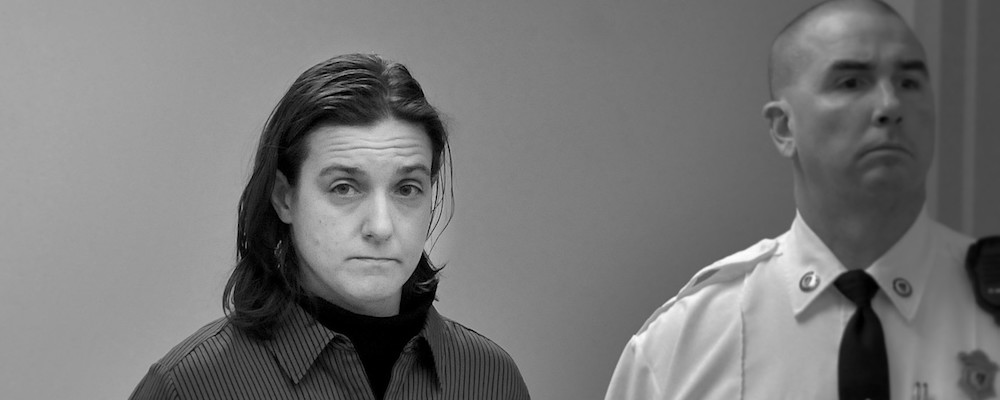Corruption Becomes an Engrossing Matter of Addiction in Docuseries ‘How to Fix a Drug Scandal’
Alci Rengifo
Netflix’s engrossing docuseries “How to Fix a Drug Scandal” puts a different spin on the recognizable narrative of police corruption. We are familiar with the stories of cops who tamper with evidence in crime scenes, but this is the first time we venture into strange happenings in the drug lab. As one of the interview subjects points out, the practice of testing and sampling confiscated narcotics rarely gets the glamorous eye of TV shows. But here the case is made quite convincingly about how when the forces of law and order veer off the honest path a lot of it can begin under the microscope.
The docuseries is set in 2012 Massachusetts where two chemists suddenly become symbols for how official institutions hide twisted truths. In Boston Annie Dookhan seems bright and driven, but when drugs are found in her desk and other workspaces, it dawns on officials that she’s an addict who has been slowly taking her stashes from confiscated materials. In Amherst, a chemist named Sonja Farak boasts an impressive test record and gains a reputation for getting work done at lightning speed. The problem is a lot of her work is manipulated or outright forged. This extends even to her credentials. Into this mess steps defense attorney Luke Ryan who seeks justice for several convicts who might actually be innocent. The revelations hint that many incarcerated individuals were at least denied a clean trial. But attempting to get justice and fair play also exposes how even higher officials willingly allowed Farak and Dookhan to carry on as long as it meant protecting the image of law enforcement fighting the good old “war on drugs.”
“How to Fix a Drug Scandal” has the absorbing feel now made famous by the kind of docuseries Netflix has become so known for producing. It’s not overly long at four chapters and every episode unfolds like a great mystery, each shocking layer revealing another revelation. Director Erin Lee Carr has used this technique of gradual revelation to visceral effect in other docuseries like “I Love You, Now Die: The Commonwealth v. Michelle Carter” for HBO, where a narrative may begin as one kind of story and then morphs into another. This one begins as a tale of addiction, with much of its early focus centered on Dookhan, who is played by a stand-in, actress Shannon O’Neill whose dialogue is taken from actual court transcripts. Carr captures the manic life of a scientist spiraling into addiction, ignoring work to sneak off with multiple kinds of narcotics. Then Farak comes more firmly into the picture. Like most memorable true crimes, it’s the wild details that stand out the most. Farak not only faked her work, she faked her academic credentials and even personal relationships. The portrait drawn is of a desperate ego seeking attention and as a result endangering the lives of accused men in court. The two women become links in two different locales which then expose a greater rot in the Massachusetts court system.
If lab experts going rogue isn’t enough, “How to Fix a Drug Scandal” then generates a more urgent sense of outrage once an attorney like Luke Ryan narrates the stunning complicity of higher ups. Experts explain how there’s a pop cultural myth that assures us lab workers are neutral, relying solely on scientific principles. Yet here we see onscreen emails where Farak brazenly exchanges messages with prosecutors, cheering on taking down “bad people” and showing little sense of professional conduct. The most disturbing revelation of this docuseries is how we may be at the mercy of those who have already decided our fate. Farak and Dookhan were still lower players when compared to then-Attorney General Martha Coakley and assistant attorney generals Anne Kaczmarek and Kris Foster, who then attempted to provide the fix of the title. If this wasn’t nonfiction it would be farcical dark comedy to see how these officials first attempt to dismiss the lab scandals as minor blips, claiming there was little damage as a result of what Farak and Dookhan were up to. They then descend into other unsavory practices like withholding evidence.
Like a John Grisham thriller but more visceral because it’s true, “How to Fix a Drug Scandal” races by with its combination of engaging angles. Narcotics abuse, the miscarriage of justice, and how addicts become the playthings of the system make this a chronicle of power out of control. The story is set in Massachusetts, but its dark impulses can no doubt be found anywhere.
“How to Fix a Drug Scandal” begins streaming April 1 on Netflix.

